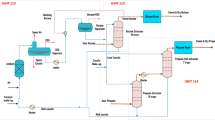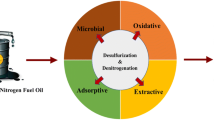Abstract
In recent decades, the oil refining industry’s interest has been geared toward the production of clean fuels that contain fewer impurities such as sulfur and nitrogen compounds. Diesel hydrodesulfurization (DHDS) employed in light gas oil production has been widely applied to remove various impurities such as sulfur, nitrogen, and metal-organic compounds. In this study, the hydrodesulfurization process for the production of ultra-low sulfur diesel was simulated using the Aspen HYSYS hydroprocessing bed module. Then, exergy analysis was conducted. Since the exergy analysis indicated possible energy savings on the conventional DHDS, heat exchanger network (HEN) synthesis was applied to the process. By replacing the heater and cooler with two heat exchangers, 5% of utility energy could be saved compared to the conventional process. Since the modification was relatively simple, the developed HEN synthesis is feasible in the present DHDS.
Similar content being viewed by others
References
E. S. Sbaaei and T. S. Ahmed, Fuel, 212, 61 (2018).
“IMO 2020 SOx regulation,” Shipping NewsNet.com, last modified n.d., accessed May 15, 2019, http://www.shippingnewsnet.com/news/articleView.html?idxno=24990.
Aspen technology, “Aspen Energy Analyzer Reference Guide v10.0” Aspen technology, USA (2018).
D. Remesat, B. Young and W.Y. Surcek, Chem. Eng. Res. Des., 87(2A), 153 (2009).
D. Diane, F.R. Maria and Â. Cristina, Técnico Lisboa. (2016).
M. M. Said, T. S. Ahmed and T. M. Moustafa, Energy Fuels, 28(12), 7726 (2014).
F. Dai, H.Y. Wang, M.M. Gong, C. S. Li, Z.X. Li and S. J. Zhang, Energy Fuels, 29(11), 7532 (2015).
C. Yin and Y. Wang, Korean J. Chem. Eng., 34(4), 1004 (2017).
H. Yamada and S. Goto, Korean J. Chem. Eng., 21(4), 773 (2004).
M.H. Park, C. Kim and G. Tsatsaronis, Korean J. Chem., 2, 3557 (1998).
X. Luo, Q. Guo, D. Zhang, D. Zhou and Q. Yang, Appl. Therm. Eng., 140, 102 (2018).
T.V. Nguyen, L. Pierobon and B. Elmegaard, Energy, 62, 23 (2013).
C. Bengtsson, R. Nordman and T. Berntsson, Appl. Therm. Eng., 22(9), 1069 (2002).
L. J. Matijasevic and H. Otmacic, Appl. Therm. Eng., 22, 477 (2002).
I. Dincer and M. A. Rosen, Elsevier Sci., 2, 31 (2013).
J.Y. Yi and C. Lee, KSFM, 18(6), 19 (2015).
D. Bose, WSN, 3, 99 (2015).
A. Koriakin, K.M. Ponvel and C. H. Lee, Chem. Eng. J., 162(2), 649 (2010).
J.M. Kwon, J.H. Moon, Y. S. Bae, D. G. Lee, H. C. Sohn and C.H. Lee, Chem. Sus. Chem., 1, 307 (2008).
“Pinch Technology: Basics for the Beginners,” http://pages.mtu.edu, last modified n.d., accessed May 15, 2019, http://pages.mtu.edu/~jwsuther/erdm/pinchtech.pdf.
Acknowledgements
This work was supported by the Industrial Strategic Technology Development Program-Engineering Core Technology Development Project (Project No. 10077467, Development of basic design and FEED automation task support system based on Cloud system) funded by the Ministry of Trade, Industry & Energy (MOTIE, Korea).
Author information
Authors and Affiliations
Corresponding authors
Rights and permissions
About this article
Cite this article
Ryu, HW., Kim, NG., Kang, SO. et al. Hydrodesulfurization via heat exchanger network synthesis for ultra-low-sulfur diesel. Korean J. Chem. Eng. 36, 1226–1234 (2019). https://doi.org/10.1007/s11814-019-0301-3
Received:
Accepted:
Published:
Issue Date:
DOI: https://doi.org/10.1007/s11814-019-0301-3




